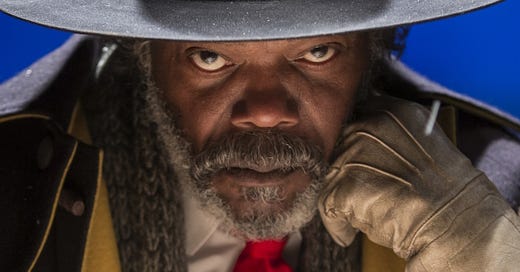Samuel L. Jackson and Writing Profanity
Some things to consider before putting salty language in your stories
If there is one thing iconic actor and movie star Samuel L. Jackson is known for, it is his propensity for profanity. He says certain swear words in such an emphatic way, they often become defining moments of the films he appears in. One has to wonder if screenwriters writing scripts with him in mind actually write his swear words into their scripts. This is a good question for other typically foul-mouthed actors like Joe Pesci and Jonah Hill, but it also speaks to the larger general issue of how much profanity is too much for a writer to use in fiction, and how can one know when they are taking things too far. Here are a few things to keep in mind when you consider using them in your stories.
Profanity as punctuation
Rap music legend Q-tip once famously said "Sometimes I have to curse just to prove my damned point." Adding a well-placed swear word can add emotion or impact, increase the intensity and raise the stakes for what is happening. It is also good for comedy, especially when a swear word is used to enhance a punchline or be the payoff of a good comedic setup. You want to establish early in your story that swear words can be part of your vocabulary so that the word in question doesn't come off as jarring or out of place. You want the profanity to sound natural to the characters and not forced.
Foul mouthed characters
I admit it. I like writing characters with potty mouths. Part of it is because I'm a pretty conservative guy in regards to personally using risque language. Hearing a cuss word from me is a rarity, although I don't have as many reservations with typing them on the interwebs. There's something liberating and cathartic about writing characters that can say stuff you wouldn't say in the same situation. On top of that, I come from environments where profanities are just a normal part of everyday language (of course these are also environments where racial/ethnic/sexist/homophobic slurs are used as terms of endearment, but I'm not opening that can of worms). If this is how normal people in the real world talk, and you want your characters to sound authentic when they speak, then I don't think swear words should be off-limits. However, you might want to study people with similar backgrounds and language as your characters and take note of how often they use profanity and in what situations.
Slang and authenticity
The lingo of the regions your characters come from might utilize swear words often. People from some areas use profanity more freely than others. You might want to consider than when crafting your characters' dialogue. For instance, If your character is British, they're more likely to let the swear words flow if they're from Sheffield or Manchester than they would be if they're from Bristol of Hull. And this is also true for swear words in foreign languages. Having your Spanish speaking character say a Spanish swear word may sound cool and authentic, but you may have Spanish-speaking readers, and overdoing it or doing it inaccurately can alienate them.
How much is too much
If you decide to include profanity in your story, You want to be careful not to overdo it, lest the swear words become more of a focal point than your story. You can risk desensitizing your readers to the point where if you want to emphasize a point with a swear word, the impact is lessened. To mitigate this, you need to have an understanding of the target audience you want consuming your story along with their level of tolerance for profanity.
Profanity is relative.
Another reason understanding your target audience is important is that you need to understand what perceptions those readers have about profanity. While in most cultures, the word "blood clot' is just an innocent medical term, in Places like Jamaica and Trinidad, it is a very offensive term and may turn off your readers from those regions. But you can add a great deal of authenticity to your characters if they speak profanities at the same level as the environment they are supposed to come from.
The risks
There are many readers that are uncomfortable with profanity
To address this, it is best to know your audience and have an understanding of the type of people you want to be receptive to your story. a YA story with a lot of swear words is obviously a hard sell, but you can also taint the mood of a romance by including too much foul language. Conversely, genres with darker elements like crime or urban fiction are less likely to be adversely affected by risque language.
You also have to weigh how much your use of swear words will affect the marketability of your story, because stories with excessive swear words could turn off certain agents, publishers and potential readers.
Conclusion
There are writers that are uncomfortable with placing profanity in their stories, but if done with care, it can add impact and realism to your more important moments in the story, and add more authenticity to your characters' speech. If you are considering putting some swear words in your story, do so with care, and make sure every word counts.
Does this article help? If so, then subscribe! I post these articles weekly.




